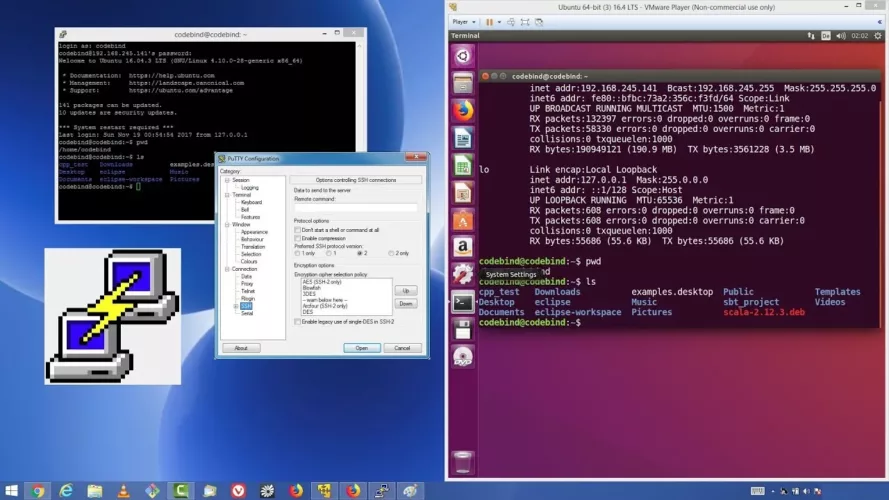PuTTY is a free Telnet and SSH client for Windows and Unix systems that also includes an xterm terminal emulator. Simon Tatham is the main author and maintainer.
These protocols are all used to connect to a computer over a network and run a remote session. 64-bit PuTTY implements the client end of the session: the end where the session is presented rather than the end where it runs.
To put it another way, you start PuTTY on a Windows machine and tell it to connect to a Unix machine, for example. The software opens a new window. Then anything you type in this window is sent directly to the Unix machine, and the response from the Unix machine is displayed in the window. So you can operate on the Unix machine as if you were sitting at its console, even if you are not.
The following tools are included in this download:
- PuTTY is a program that allows you to enter (the Telnet and SSH client itself)
- PSCP (Post-Secondary School (an SCP client, i.e. command line secure file copy)
- PSFTP is a file transfer protocol that allows you to (an SFTP client, i.e. general file transfer sessions much like FTP)
- PuTTYtel is a slang term for “puT (a Telnet client only)
- Plink, Plink (a command line interface to PuTTY backends)
- a beauty contest (an SSH authentication agent for PuTTY, PSCP and Plink)
- PuTTYgen is an acronym for “PuTTY Generation” (an RSA and DSA key generation utility).
A.2.1 Is SSH-2 supported by PuTTY?
Yes. Since version 0.50 in 2000, PuTTY has included support for SSH-2.
In 2002, SSH-2 version 0.52 introduced public key authentication (both RSA and DSA).
A.2.2 Is it possible to read OpenSSH or ssh.com SSH-2 private key files with PuTTY?
PuTTY does not handle this natively (for reasons detailed in the wishlist article), but as of version 0.53, PuTTYgen can convert OpenSSH and ssh.com private key files to PuTTY format.
A.2.3 Is SSH-1 supported by PuTTY?
Yes. In , SSH-1 functionality has always been available.
However, the SSH-1 protocol has many flaws and is no longer considered secure; if possible, use SSH-2 instead.
If the server does not appear to support SSH-2, PuTTY will no longer default to SSH-1; you must specifically request SSH-1.
A.2.4 Is local echo supported by PuTTY?
Yes. Local echo is now correctly supported in version 0.52.
Local echo could not be isolated from local line editing before version 0.51. (where you type a line of text locally, and it's not sent to the server until you hit return, so you have a chance to edit it and fix errors before the server sees it) . Local echo and local line edit are independent options in version 0.52, and by default will try to determine whether or not to enable them based on the protocol you have chosen as well as suggestions from the server. If you don't like the default settings, you can force each item to be enabled or disabled individually. The controls are located in the 'Line Discipline Options' section of the Terminal panel.
A.2.5 Is it possible to save the settings in PuTTY so that I don't have to change them every time?
Yes, you can save all PuTTY settings in named session profiles. You can also change the default session settings for new sessions. For instructions, see section 4.1.2 of the manual.
A.2.6 Is it possible to save PuTTY settings to a disk file?
At the moment no, but section 4.32 of the manual describes how to achieve the same result.
A.2.7 Is it possible to use PuTTY in fullscreen mode, similar to a DOS box?
Yes, this was added in 2002 with version 0.52.
For more information, visit the PuTTY official website.

